Deck 1: Functions and Limits
Question
Question
Question
Question
Question
Question
Question
Question
Question
Question
Question
Question
Question
Question
Question
Question
Question
Question
Question
Question
Question
Question
Question
Question
Question
Question
Question
Question
Question
Question
Question
Question
Question
Question
Question
Question
Question
Question
Question
Question
Question
Question
Question
Question
Question
Question
Question
Question
Question
Question
Question

Unlock Deck
Sign up to unlock the cards in this deck!
Unlock Deck
Unlock Deck
1/51
Play
Full screen (f)
Deck 1: Functions and Limits
1
Find the limit. 


2
For what value of the constant c is the function f continuous on 

A)
B)
C)
D)
E)


A)

B)

C)

D)

E)


3
Find the limit  ,if it exists.
,if it exists.
A)
B)
C)
D) Does not exist
 ,if it exists.
,if it exists.A)

B)

C)

D) Does not exist

4
Choose an equation from the following that expresses the fact that a function f is continuous at the number 6.
A)
B)
C)
D)
E)
A)

B)

C)

D)

E)


Unlock Deck
Unlock for access to all 51 flashcards in this deck.
Unlock Deck
k this deck
5
Use continuity to evaluate the limit. 
A) -1
B) 1
C) 0
D)
E)

A) -1
B) 1
C) 0
D)

E)


Unlock Deck
Unlock for access to all 51 flashcards in this deck.
Unlock Deck
k this deck
6
Find the limit  ,if it exists.
,if it exists.
A) 2
B) 5
C) 3
D) Does not exist
 ,if it exists.
,if it exists.A) 2
B) 5
C) 3
D) Does not exist

Unlock Deck
Unlock for access to all 51 flashcards in this deck.
Unlock Deck
k this deck
7
Find the limit  .
.
A) 12
B) -12
C) 6
D) -1
 .
.A) 12
B) -12
C) 6
D) -1

Unlock Deck
Unlock for access to all 51 flashcards in this deck.
Unlock Deck
k this deck
8
Find the limit  .
.
A)
B)
C) -1
D) 1
 .
.A)

B)

C) -1
D) 1

Unlock Deck
Unlock for access to all 51 flashcards in this deck.
Unlock Deck
k this deck
9
Find the limit. 
A)
B) 6
C) 5
D)
E) -6

A)

B) 6
C) 5
D)

E) -6

Unlock Deck
Unlock for access to all 51 flashcards in this deck.
Unlock Deck
k this deck
10
Let  Find the following limits.
Find the following limits. 
A) 3 and -3
B) both 3
C) both 1
D) 3 and -1
E) 3 and 1
 Find the following limits.
Find the following limits. 
A) 3 and -3
B) both 3
C) both 1
D) 3 and -1
E) 3 and 1

Unlock Deck
Unlock for access to all 51 flashcards in this deck.
Unlock Deck
k this deck
11
Find the limit. 
A) 11
B) 5
C) 9
D) 18
E) 0

A) 11
B) 5
C) 9
D) 18
E) 0

Unlock Deck
Unlock for access to all 51 flashcards in this deck.
Unlock Deck
k this deck
12
Determine where f is discontinuous. 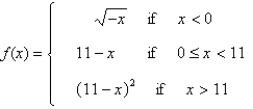
A) 0 only
B) 0 and -11
C) -11 only
D) 0 and 11
E) only
only

A) 0 only
B) 0 and -11
C) -11 only
D) 0 and 11
E)
 only
only
Unlock Deck
Unlock for access to all 51 flashcards in this deck.
Unlock Deck
k this deck
13
Find the vertical asymptotes of the function. 
A)
B)
C)
D)
E) None of these

A)

B)

C)

D)

E) None of these

Unlock Deck
Unlock for access to all 51 flashcards in this deck.
Unlock Deck
k this deck
14
Determine where f is discontinuous. 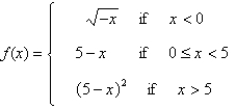


Unlock Deck
Unlock for access to all 51 flashcards in this deck.
Unlock Deck
k this deck
15
For the function f whose graph is shown,state the following. 
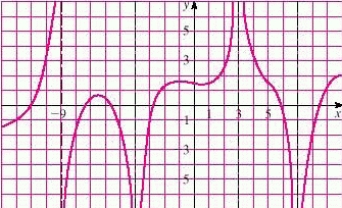



Unlock Deck
Unlock for access to all 51 flashcards in this deck.
Unlock Deck
k this deck
16
If f and g are continuous functions with 
A)
B)
C)
D)
E)

A)

B)

C)

D)

E)


Unlock Deck
Unlock for access to all 51 flashcards in this deck.
Unlock Deck
k this deck
17
Evaluate the limit. 
A) -189
B) -1010
C) -1000
D) 135
E) -990

A) -189
B) -1010
C) -1000
D) 135
E) -990

Unlock Deck
Unlock for access to all 51 flashcards in this deck.
Unlock Deck
k this deck
18
Find the limit. 
A)
B)
C)
D)
E)

A)

B)

C)

D)

E)


Unlock Deck
Unlock for access to all 51 flashcards in this deck.
Unlock Deck
k this deck
19
Evaluate the limit,if it exists. 
A)
B) 1
C) -7
D)
E) does not exist

A)

B) 1
C) -7
D)

E) does not exist

Unlock Deck
Unlock for access to all 51 flashcards in this deck.
Unlock Deck
k this deck
20
For x = 5 determine whether f is continuous from the right,from the left,or neither. 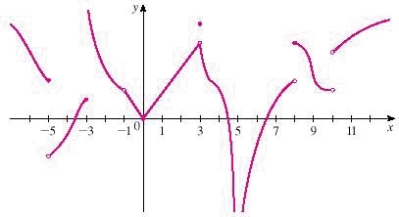


Unlock Deck
Unlock for access to all 51 flashcards in this deck.
Unlock Deck
k this deck
21
Evaluate the limit. 


Unlock Deck
Unlock for access to all 51 flashcards in this deck.
Unlock Deck
k this deck
22
The graphs of f(x) and g(x) are given.For what values of x is f(x) = g(x) ? 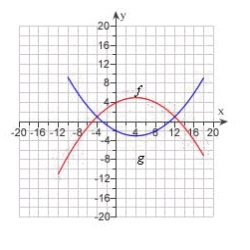
A) 4,2
B) 0
C) -2,5
D) -4,12
E)

A) 4,2
B) 0
C) -2,5
D) -4,12
E)


Unlock Deck
Unlock for access to all 51 flashcards in this deck.
Unlock Deck
k this deck
23
The graph of the function  is given.State the value of
is given.State the value of  .
. 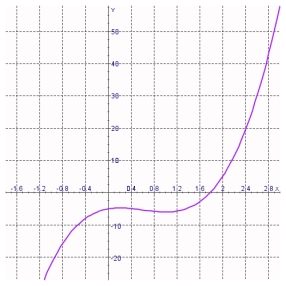
A)
B)
C)
D)
E)
 is given.State the value of
is given.State the value of  .
. 
A)

B)

C)

D)

E)


Unlock Deck
Unlock for access to all 51 flashcards in this deck.
Unlock Deck
k this deck
24
Use the graph of the function to state the value of  if it exists.
if it exists. 
A)
B) 1
C)
D)
E) does not exist
 if it exists.
if it exists. 
A)

B) 1
C)

D)

E) does not exist

Unlock Deck
Unlock for access to all 51 flashcards in this deck.
Unlock Deck
k this deck
25
Find an expression for the function y = f(x) whose graph is the bottom half of the parabola  .
.
A)
B)
C)
D)
E)
 .
.A)

B)

C)

D)

E)


Unlock Deck
Unlock for access to all 51 flashcards in this deck.
Unlock Deck
k this deck
26
Evaluate the limit. 


Unlock Deck
Unlock for access to all 51 flashcards in this deck.
Unlock Deck
k this deck
27
The monthly cost of driving a car depends on the number of miles driven. Julia found that in October it cost her $200 to drive 300 mi and in July it cost her $350 to drive 600 mi. Express the monthly cost C as a function of the distance driven d assuming that a linear relationship gives a suitable model.
A)
B)
C)
D)
E)
A)

B)

C)

D)

E)


Unlock Deck
Unlock for access to all 51 flashcards in this deck.
Unlock Deck
k this deck
28
If  ,find and simplify
,find and simplify  ,where
,where  .
.
A)
B)
C)
D)
 ,find and simplify
,find and simplify  ,where
,where  .
.A)

B)

C)

D)


Unlock Deck
Unlock for access to all 51 flashcards in this deck.
Unlock Deck
k this deck
29
Many physical quantities are connected by inverse square laws,that is,by power functions of the form  . In particular,the illumination of an object by a light source is inversely proportional to the square of the distance from the source.Suppose that after dark you are in a room with just one lamp and you are trying to read a book.The light is too dim and so you move
. In particular,the illumination of an object by a light source is inversely proportional to the square of the distance from the source.Suppose that after dark you are in a room with just one lamp and you are trying to read a book.The light is too dim and so you move  the distance to the lamp.How much brighter is the light?
the distance to the lamp.How much brighter is the light?
A) times
times
B) times
times
C) times
times
D) times
times
 . In particular,the illumination of an object by a light source is inversely proportional to the square of the distance from the source.Suppose that after dark you are in a room with just one lamp and you are trying to read a book.The light is too dim and so you move
. In particular,the illumination of an object by a light source is inversely proportional to the square of the distance from the source.Suppose that after dark you are in a room with just one lamp and you are trying to read a book.The light is too dim and so you move  the distance to the lamp.How much brighter is the light?
the distance to the lamp.How much brighter is the light?A)
 times
timesB)
 times
timesC)
 times
times D)
 times
times
Unlock Deck
Unlock for access to all 51 flashcards in this deck.
Unlock Deck
k this deck
30
The graph shown gives the weight of a certain person as a function of age.Find the age at which the person started an exercise program. 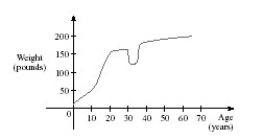
A) 54
B) 38
C) 30
D) 20
E) 35

A) 54
B) 38
C) 30
D) 20
E) 35

Unlock Deck
Unlock for access to all 51 flashcards in this deck.
Unlock Deck
k this deck
31
It makes sense that the larger the area of a region,the larger the number of species that inhabit the region.Many ecologists have modeled the species-area relation with a power function and,in particular,the number of species S of bats living in caves in central Mexico has been related to the surface area A measured in  of the caves by the equation
of the caves by the equation  (a)The cave called mission impossible near puebla,mexico,has surface area of
(a)The cave called mission impossible near puebla,mexico,has surface area of  .
.
How many species of bats would expect to find in that cave?
(b)If you discover that 5 species of bats live in cave estimate the area of the cave.
 of the caves by the equation
of the caves by the equation  (a)The cave called mission impossible near puebla,mexico,has surface area of
(a)The cave called mission impossible near puebla,mexico,has surface area of  .
.How many species of bats would expect to find in that cave?
(b)If you discover that 5 species of bats live in cave estimate the area of the cave.

Unlock Deck
Unlock for access to all 51 flashcards in this deck.
Unlock Deck
k this deck
32
Find the domain and sketch the graph of the function.What is its range? f (x) = 
A)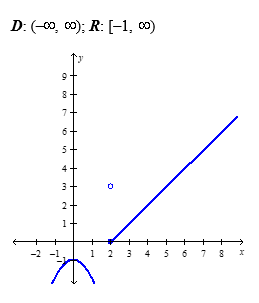
B)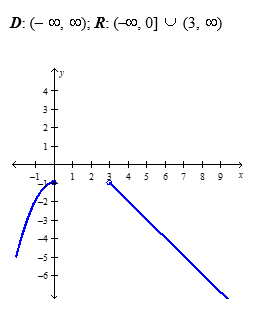
C)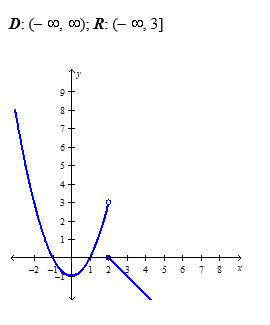
D)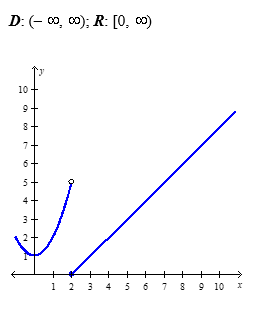

A)

B)

C)

D)


Unlock Deck
Unlock for access to all 51 flashcards in this deck.
Unlock Deck
k this deck
33
If  ,evaluate the difference quotient
,evaluate the difference quotient  .
.
A)
B)
C)
D) h
E) none of these
 ,evaluate the difference quotient
,evaluate the difference quotient  .
.A)

B)

C)

D) h
E) none of these

Unlock Deck
Unlock for access to all 51 flashcards in this deck.
Unlock Deck
k this deck
34
Find the limit  ,if it exists.
,if it exists.
 ,if it exists.
,if it exists.
Unlock Deck
Unlock for access to all 51 flashcards in this deck.
Unlock Deck
k this deck
35
The relationship between the Fahrenheit and Celsius temperature scales is given by the linear function.  Complete the table and find the slope.
Complete the table and find the slope. 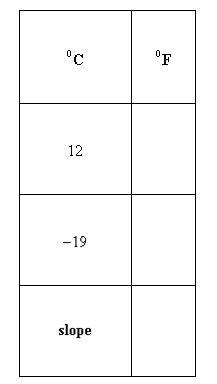
 Complete the table and find the slope.
Complete the table and find the slope. 

Unlock Deck
Unlock for access to all 51 flashcards in this deck.
Unlock Deck
k this deck
36
The relationship between the Fahrenheit and Celsius temperature scales is given by the linear function.  What is the F-intercept and what does it represent?
What is the F-intercept and what does it represent?
A) ,Fahrenheit temperature corresponding to
,Fahrenheit temperature corresponding to 
B) 32,Fahrenheit temperature corresponding to
C) 32,Celsius temperature corresponding to
D) 0,Fahrenheit temperature corresponding to
E) ,Celsius temperature corresponding to
,Celsius temperature corresponding to 
 What is the F-intercept and what does it represent?
What is the F-intercept and what does it represent?A)
 ,Fahrenheit temperature corresponding to
,Fahrenheit temperature corresponding to 
B) 32,Fahrenheit temperature corresponding to

C) 32,Celsius temperature corresponding to

D) 0,Fahrenheit temperature corresponding to

E)
 ,Celsius temperature corresponding to
,Celsius temperature corresponding to 

Unlock Deck
Unlock for access to all 51 flashcards in this deck.
Unlock Deck
k this deck
37
A rectangle has perimeter 14 m.Express the area of the rectangle as a function  of the length
of the length  of one of its sides.
of one of its sides.
A)
B)
C)
D)
E)
 of the length
of the length  of one of its sides.
of one of its sides.A)

B)

C)

D)

E)


Unlock Deck
Unlock for access to all 51 flashcards in this deck.
Unlock Deck
k this deck
38
Find the limit  .
.
 .
.
Unlock Deck
Unlock for access to all 51 flashcards in this deck.
Unlock Deck
k this deck
39
Find the domain of the function. 
A) (- ,0)
B)
C)
D)

A) (- ,0)
B)

C)

D)


Unlock Deck
Unlock for access to all 51 flashcards in this deck.
Unlock Deck
k this deck
40
Use the graph of the function to state the value of  ,if it exists.
,if it exists. 
A)
B)
C)
D)
E) does not exist
 ,if it exists.
,if it exists. 
A)

B)

C)

D)

E) does not exist

Unlock Deck
Unlock for access to all 51 flashcards in this deck.
Unlock Deck
k this deck
41
Which of the following graphs is neither even nor odd?
A)
B)
C)
A)

B)

C)


Unlock Deck
Unlock for access to all 51 flashcards in this deck.
Unlock Deck
k this deck
42
Find the domain of the function. 


Unlock Deck
Unlock for access to all 51 flashcards in this deck.
Unlock Deck
k this deck
43
Refer to the graph of the function f in the following figure. 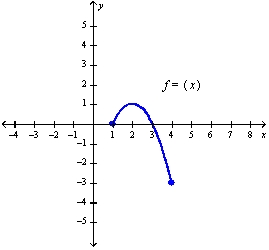
a.Find f (1).
b.Find the value of x for which (i) f(x) = 1 and (ii) f(x) = 0.
c.Find the domain and range of f.

a.Find f (1).
b.Find the value of x for which (i) f(x) = 1 and (ii) f(x) = 0.
c.Find the domain and range of f.

Unlock Deck
Unlock for access to all 51 flashcards in this deck.
Unlock Deck
k this deck
44
Determine whether f is even,odd,or neither. 


Unlock Deck
Unlock for access to all 51 flashcards in this deck.
Unlock Deck
k this deck
45
If the point ( 7, 3 ) is on the graph of an even function,what other point must also be on the graph?
A) ( 7 , -3)
B) (0 , 0)
C) ( -7 , -3)
D) ( -7 , 3)
E) None of these
A) ( 7 , -3)
B) (0 , 0)
C) ( -7 , -3)
D) ( -7 , 3)
E) None of these

Unlock Deck
Unlock for access to all 51 flashcards in this deck.
Unlock Deck
k this deck
46
Find the domain of the function. 


Unlock Deck
Unlock for access to all 51 flashcards in this deck.
Unlock Deck
k this deck
47
The graphs of f(x) and g(x) are given. Find the values of f (-4) and g (3). 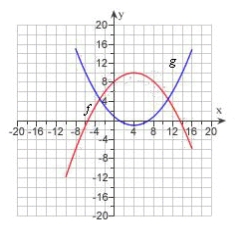


Unlock Deck
Unlock for access to all 51 flashcards in this deck.
Unlock Deck
k this deck
48
Determine whether the function is even,odd,or neither. 


Unlock Deck
Unlock for access to all 51 flashcards in this deck.
Unlock Deck
k this deck
49
An open rectangular box with volume 
 has a square base.Express the surface area of the box as a function
has a square base.Express the surface area of the box as a function  of the length x of a side of the base.
of the length x of a side of the base.
A)
B)
C)
D)
E)

 has a square base.Express the surface area of the box as a function
has a square base.Express the surface area of the box as a function  of the length x of a side of the base.
of the length x of a side of the base.A)

B)

C)

D)

E)


Unlock Deck
Unlock for access to all 51 flashcards in this deck.
Unlock Deck
k this deck
50
Determine whether the function whose graph is given is even,odd,or neither. 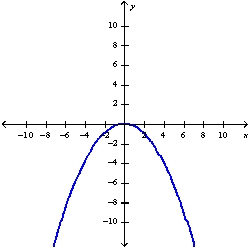
A) Even
B) Neither
C) Odd

A) Even
B) Neither
C) Odd

Unlock Deck
Unlock for access to all 51 flashcards in this deck.
Unlock Deck
k this deck
51
If f (x)=  find f (-4) , f (0), and f (1).
find f (-4) , f (0), and f (1).
 find f (-4) , f (0), and f (1).
find f (-4) , f (0), and f (1).
Unlock Deck
Unlock for access to all 51 flashcards in this deck.
Unlock Deck
k this deck


